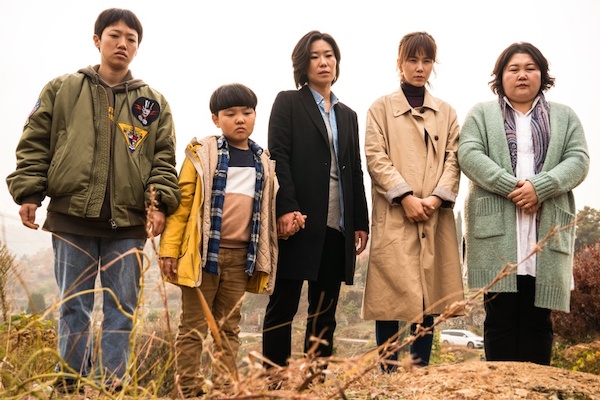Anyone who’s ever been part of a dysfunctional relationship (be it in a family, friendship, or otherwise) will immediately recognize the constant bickering and cut-throat antics between the protagonists of Jeong Seung-o’s socially astute comedic drama Move the Grave. In his debut feature, Jeong challenges some of the most traditional Korean values, asking the very serious question of whether or not they can survive the 21st century.
Move the Grave tells the story of one unusual day in the Baek family. Immediately after she’s forced to quit her job for taking a maternity leave, Hye-yeong Baek (Jang Liu, in an amazingly stoic performance) receives a notification that her father’s grave must be moved due to construction. She, her three sisters, and her troublemaking son set out for a long drive to their uncle’s house, from where they’ll carry out the relocation. The only member of the family missing is their brother, Seung-rak (Kwak Min-gyoo), but he is not answering their calls. They know he never does, except when he needs money, so they decide to leave without him
The film wastes no time in letting us know that this is not the happy-go-lucky, “little house on the prairie” kind of family. As Hye-yeong and her sisters depart for her uncle’s house, minor conflicts begin to gradually emerge until they escalate to fully fledged shouting matches, and more. Like in Sartre’s No Exit (substituting hell for a minivan), the sisters pick at each other’s weaknesses almost to a breaking point. Though easily mistaken for hate, we learn that this is not the case – the sisters simply know each other too well not to incite conflict. This is a real family, one without a hint of idealization or convenient “on-screen” benevolence. Even their casual banter bears the marks of a completely lived-in existence, with all the mundane details that come from marriage, relationships, motherhood, and everything else that qualifies these people’s every-day lives. This naturalistic approach in Move the Grave is punctuated by a narrative that moves mostly through dialogue, very much like that of a stage play. The framing is simple and predominantly static, without any eye-catching camera work or use of lens, relying instead on the strength of the performances to elevate the dramatic action of each scene. And it works. The cast’s talent and chemistry come through right from the start.
To no one’s surprise, the first trip turns out a waste when the sisters find out that their uncle refuses to move the grave without the only son (their brother, Seung-rak) present. Therefore, they must all go back and find Seung-rak, even though they don’t know where he lives. This brings up more conflict, and inevitably, reignites old and forgotten wounds.
As such, there is a shift in the film. We move from a story that is about a dysfunctional family, to a story about a dysfunctional patriarchy in a world where traditions are beginning to crumble. And as we learn, a world full of single mothers, absent fathers, and excess token masculinity has no use for an outdated mode of family structure and social hierarchy. In a different context, Seung-rak might have been considered stoic, wise, respectable…. But once the “stained glass ceiling” is broken (quite literally, as Hye-yeong kicks open the window to his tiny apartment), Seung-rak is just another guy trying to get out of child support.
The social message is strong, though it lacks nuance, especially in the second half of the film which turns-up the heavy-handedness to a hundred. Characters even go as far as to shout out the film’s message (one of them, anyway). While the filmmakers may have felt that this was necessary in a country that consistently ranks among the highest for gender inequality, a more subtle approach would have helped their ideals resonate stronger. As it is, the message wins only because the patriarchy quietly gives up. Seung-rak is such a cartoonish, incompetent male figure that the story can’t have any other ending.
Nevertheless, Move the Grave remains a fun and poignant film, with an interesting plot, top-notch performances, and strong sense of social awareness. The ending may be more an act of wishful thinking than a call to action, but this will not stop the audience from asking the right questions about the environment in which they live.
Move the Grave is showing at the New York Asian Film Festival 2019 on July 6.
Comments
Post a Comment